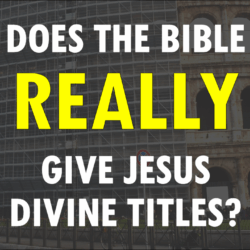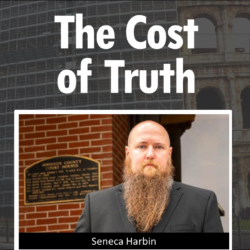 With this episode we are beginning a series on overcoming objections to Christianity. To start with we want to address the criticism often leveled at bible-believing Christians today that our perspective on salvation is too narrow-minded and exclusive. Who are we to say that all the other religions are wrong? In order to tackle this issue, we begin with the words of Jesus himself who said, “I am the way, and the truth, and the life. No one comes to the Father except through me” (John 14.6). If we remain committed to scripture then the question is not, “Is Christ the only way to salvation?” but “How is that fair?” What about the old lady in Fiji who never got a chance to hear about Jesus? Listen in as we explore five answers to this important question.
With this episode we are beginning a series on overcoming objections to Christianity. To start with we want to address the criticism often leveled at bible-believing Christians today that our perspective on salvation is too narrow-minded and exclusive. Who are we to say that all the other religions are wrong? In order to tackle this issue, we begin with the words of Jesus himself who said, “I am the way, and the truth, and the life. No one comes to the Father except through me” (John 14.6). If we remain committed to scripture then the question is not, “Is Christ the only way to salvation?” but “How is that fair?” What about the old lady in Fiji who never got a chance to hear about Jesus? Listen in as we explore five answers to this important question.
Notes and Links:
- For a masterful presentation concerning Christian exclusiveness, check out Tim Keller’s lecture at Berkley.
- See also Podcast 51: Pluralism, Post-Modernism, Relativism, and Truth
- Episodes in this series on Overcoming Objections to Christianity:
- Intro music: “Protofunk” by Kevin MacLeod. Licensed under Creative Commons: By Attribution 3.0 License.







The key to finding real truth is searching for it with a sincere heart, that is, for the right reasons; maybe that’s why it takes such a long time for many to find it.
It is God who set the standards for true worship, not us (John 4:24). And God does not force anyone to serve him.
What about people who have never heard of Jesus? God will be their judge (John 15:22; 1 Tim 2:4). We know there is to be a second resurrection (Rev 20:11-15), and not everyone ends up in the lake of fire. “Anyone whose name was not found in the book of life was thrown into the lake of fire (v15). Rom 2:14-16 also provides hope for those in the second resurrection, I think. We all have unbelieving relatives who have died, and we cannot always be sure that we will see everyone again – that’s in God’s hands. However, we can be certain of Jesus’ words at Matt 12:48-50.
Indeed God does not tell us everything, and there is much for which we will have to wait, but what we do know is that God is our Father and Jesus is our brother, and that’s why we believe. Our work now is to preach the Good News of the Kingdom, as Jesus taught, with love and humility. 1 Pet 3:15
Great conversation and good comments by all. I have a thought or two and will try to be succinct.
A good approach in this post-modern, skeptical, society might be to start outside of the Bible. Sort of take the generic approach of Paul in Romans 1 and 2. Start at the beginning. God has written eternity on the hearts of men. So, what does your human heart really long for more than anything? If we are honest, humans long for very human things. A life hiking this planet’s mountains, swimming in its lakes, fishing in its streams; and all with no pain, no war, no homelessness, no hunger or thirst. And having an increased ability to manipulate the cosmos which is currently in a state of corruption but awaits us to release it. If we are honest with our hearts, being absorbed into the cosmic consciousness and losing our individuality while doing who knows what, is not appealing at all. Neither is playing harps on clouds, having picnics with relatives 24/7, or staring into the face of God for all eternity. And it just so happens that when you look around the religious landscape there is one God who claims to be our Creator, and who has the plan to give us these very things we do long for. No one else does. Therefore,Yaweh, our Father, becomes the attractive choice and we choose Him. And when we do, Jesus the Messiah will come into view inevitably, of course.
I also liked the concept of letting God be the just and merciful God he is, and not sitting on the judgment seat in his stead regarding anyone. However, again I like Paul’s approach in Romans. I don’t think we can use a few verses in Romans 2 to say that God will judge some on the basis of their “Law” in the conscience, while everyone else gets judged on the righteousness of faith. There is only one set of criteria. What Paul is really doing in 1 and 2 is to level the playing field for all human beings regarding the law system which is really a weak substitute for the genuine article. By chapter 3 he says there is none righteous, not one. I take great comfort in two things. First, that there is one way for everyone. Two, that God desires all men to be saved and come to the knowledge of the truth. That means there must be a mechanism for those who really had no fair chance in this age to know the particulars of the salvation God provides through Christ. Jesus said things like it would be more tolerable for Sodom and Gomorrah than for the self-righteous Pharisees in the judgment; the same for Tyre and Sidon, and the Queen of the south. Those in Romans 2 who did not have these life saving truths will have an opportunity in a future time to accept or reject these things. God has the wisdom to accurately use a sliding scale for this. So having this perspective, allows me to be dogmatic about what’s required for salvation, while at the same time believing there is a fall harvest that will be much larger than this spring harvest at the end of this age. The only unpardonable sin is to believe and know the truth, but then to reject it…to say “I just don’t want it, thanks anyway”.
Great discussion on what seems to be a interesting series about Soteriology. I have something I’d like to ask you guys to maybe discuss if you can. To start, I agree that Jesus is the only way to the Father, but not that only Christians can have hope of entering eternal life, for this to be true, the mechanism of salvation would of had to change from the Hebrew Scriptures to the Greek Scriptures. I understand that what Jesus said is true, and it has always been true. Those men like Abraham, David, Joseph, Josiah, Hezekiah ect. all came to the Father through Jesus, but this doesn’t mean that God imparted them with a secret revelation about placing faith in the atoning death and resurrection of Jesus. They we’re certainly saved by their faith, just like we are, but faith in God’s promises which are described throughout the Hebrew Scriptures. I have Jewish friends, Messianic and Orthodox. What would make the Orthodox who are well read in history want to believe in a Jesus presented to them? They knowledgeable about the anti semetic teachings of Tertullian and Chrystostom, the Crusades, the Spanish inquisition, Martin Luther’s anti-semetic booklet ‘The Jews and Their Lies’ ect, and to conclude, the majority of Christianity teaches that Jesus cancels the Torah, which, by their, and my own, understanding means that he is a false Messiah. I’m not talking about the salvation of hindus, or muslims or new age crunchies, I’m talking about the people who the promises of God were given to, the Kingdom of Priests, the Light to the Nations. Fortunately we have Romans 9-11. There are Jews I know, who are content with being hardened as Paul says in Romans 11:25, they say that it’s on God if they’re hardened. What for? for the inclusion of us Gentiles. Further in Romans 11:29 it mentions that the gifts and promises are irrevocable, those are the promises and gifts ascribed to the Jewish people. To conclude, Jews who are in covenant fidelity today and who have been throughout history are only holding on to the promises that were given to them and I have no reason to doubt that when the fullness of Gentiles is up, that God will soften them and they will acknowledge their Messiah. I imagine it to be similar to Joseph’s revealing himself to his brother’s, he does not punish them for what they did to him, but welcomes and forgives them. I’m aware this is messy stuff but I would love to hear you guys discuss this for a bit if you can. God Bless and keep up the interesting dialog.
Why would anyone think that because Jesus put an end to the law through his own body, that he could be false? That doesn’t make any sense. By his obedience, being who he was, he was given that work to do, and he did it, in order to make for a better way than the law provided. As pertaining to the keeping of the law, Jesus killed it. That’s right. He nailed it, doing so in his own body on the tree, thus providing salvation to all who would believe in him.